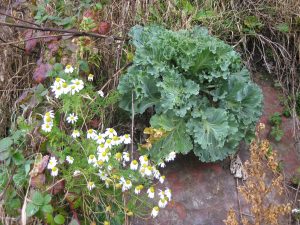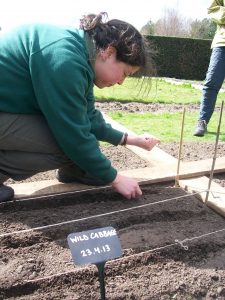This summer we’ll be investigating the wild relatives of some of our most familiar vegetables with our ‘Really Wild Vegetable’ trial (as part of the Talking Science Project). All crops have been developed over thousands of years from wild plants. Many of the wild relatives of our familiar crops are still around today, although a few are now rare or endangered in the wild.

Brassica oleracea var. oleracea growing wild in Crail, Fife
Domestication of crop plants involves selection of desirable traits to increase yield and uniformity. A consequence of selection is that genetic diversity is lost. Crop wild relatives are therefore a repository of genes that can be used to create disease resistant and improved varieties. The idea behind ‘Really Wild Vegetables’ is to trial a range of crop wild relatives alongside their domesticated cousins and to monitor the following attributes:
- Incidence and severity of pests and diseases
- Productivity
- Nutritional value as determined by laboratory analysis
- Taste as determined by the growers!
The trials will be conducted both at the Royal Botanic Garden Edinburgh by the Edible Gardening Project and by community gardening groups across Scotland. Girvan Community Garden, Good For Ewe, Whitmuir Organic Farm and Applecross Primary School are all taking part.
Plants for inclusion are those crops that have wild relatives native to Scotland:
- Sea Radish (Raphanus raphanistrum subsp. maritimus) and Radish
- Sea Beet (Beta vulgaris subsp. maritima) and Swiss Chard
- Wild Cabbage (Brassica oleracea var. oleracea) and Cabbage
The Edible Gardening team at the Botanics started sowing the Brassica seeds last week – watch this space for project updates over the summer.

